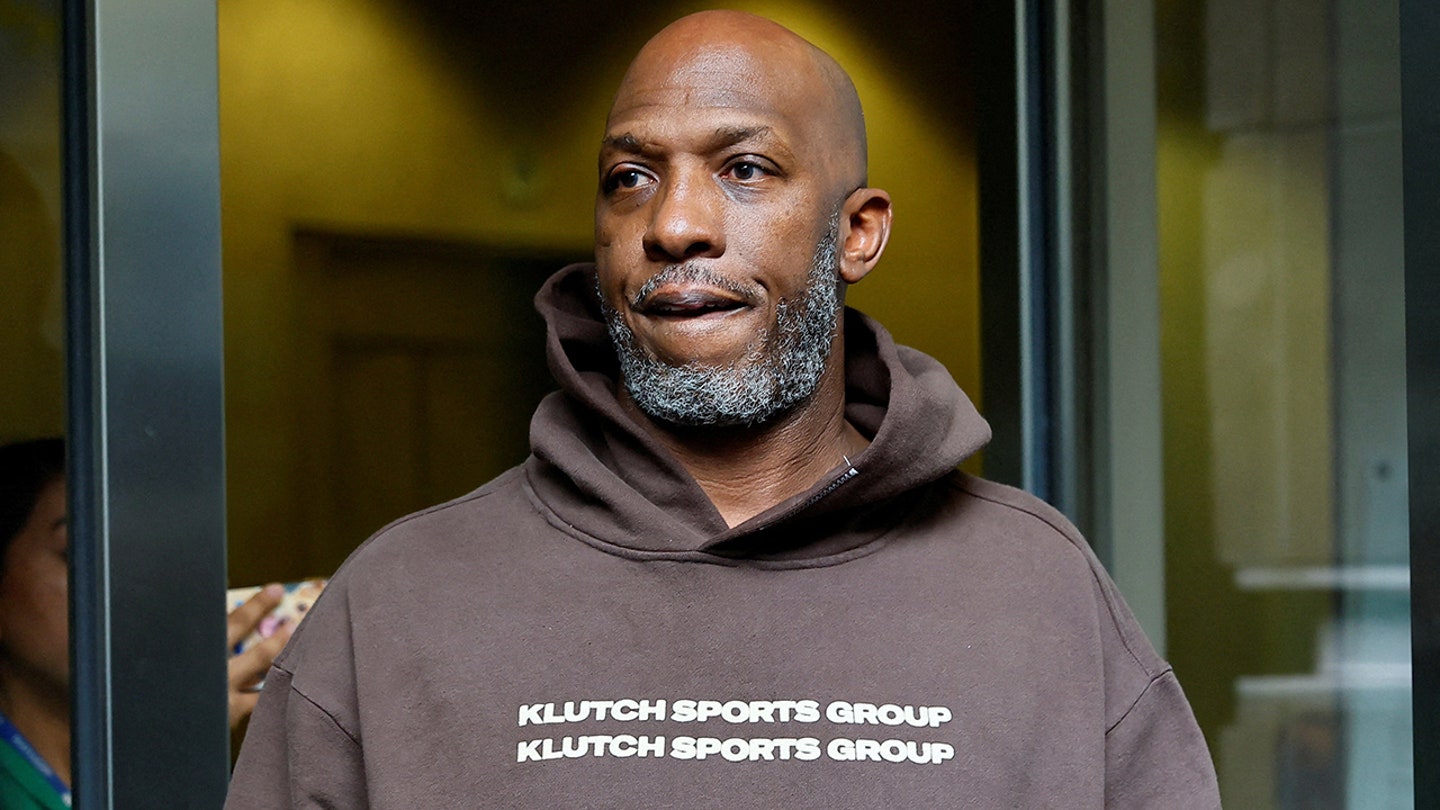
LSU women's basketball star questions governor's push for school to erect statue of Charlie Kirk
Entities mentioned:
- Flau'jae Johnson: Justice, Self-respect, Moral outrage
- Gov. Jeff Landry: Influence, Recognition, Righteousness
- Charlie Kirk: Legacy, Influence, Righteousness
- LSU: Unity, Recognition, Freedom
Article Assessment:
Credibility Score: 70/100
Bias Rating: 55/100 (Center)
Sentiment Score: 30/100
Authoritarianism Risk: 45/100 (Mixed/Neutral)
Bias Analysis:
The article presents both sides of the debate, quoting directly from key players. However, it leans slightly right by giving more context to Kirk's background and conservative event attendance.
Key metric: Campus Free Speech Index
Let me tell you something, folks - this is a HEATED MATCHUP between Team Free Speech and Team Social Justice! We've got a real CLASH OF TITANS here, with Gov. Landry making a bold offensive play by proposing a Charlie Kirk statue. But hold onto your hats, because LSU star Flau'jae Johnson is coming in hot with a DEFENSIVE SHUTDOWN! She's not just guarding the paint, she's guarding the entire campus against what she sees as a FOUL MOVE. This is a fourth-quarter nail-biter that could go into overtime, with the Campus Free Speech Index hanging in the balance. It's like we're watching a high-stakes game of political basketball, and both sides are leaving it ALL on the court!

Former NFL coach Tony Dungy rails against league's replay assist rules: 'You create a credibility issue'
Entities mentioned:
- NFL: Control, Competitive spirit, Professional pride
- Tony Dungy: Justice, Professional pride, Righteousness
- Roger Goodell: Control, Power, Professional pride
Article Assessment:
Credibility Score: 75/100
Bias Rating: 50/100 (Center)
Sentiment Score: 35/100
Authoritarianism Risk: 25/100 (Generally Democratic)
Bias Analysis:
The article presents both NFL's perspective and Dungy's criticism, maintaining a balanced approach. It provides context and examples without overtly favoring either side of the argument.
Key metric: NFL Game Integrity Index
Let me tell you something - this story is a GAME-CHANGER for the NFL! Tony Dungy is coming off the sidelines and throwing a Hail Mary pass to overhaul the league's replay system. The NFL's current playbook on reviews is fumbling the ball, folks! Dungy's calling for an audible to make EVERY play reviewable. This isn't just moving the goalposts - it's like changing the whole dang field! The league's credibility is on the line here, and Dungy's not afraid to throw the challenge flag. We're talking fourth quarter, two-minute drill type urgency to fix this mess before the NFL loses its championship mentality. The expedited review system? That's like having instant replay for some players but not others - it just doesn't fly in a fair fight! Goodell and the NFL brass need to huddle up and make a game-winning decision before they lose the trust of the fans in the stands!

Terry Rozier's attorney maintains innocence, says government is 'making deals with the devil' for cooperation
Entities mentioned:
- Terry Rozier: Self-preservation, Professional pride, Justice
- Jim Trusty: Loyalty, Righteousness, Determination
- Government Prosecutors: Ambition, Justice, Power
- Charlotte Hornets: Competitive spirit, Professional pride, Self-preservation
Article Assessment:
Credibility Score: 65/100
Bias Rating: 55/100 (Center)
Sentiment Score: 30/100
Authoritarianism Risk: 35/100 (Generally Democratic)
Bias Analysis:
The article presents both the prosecution's case and the defense's arguments, maintaining a relatively balanced approach. However, it gives slightly more space to the defense's perspective, which nudges it towards the center.
Key metric: NBA Player Integrity
Let me tell you something, folks - this is a FULL COURT PRESS on Terry Rozier's reputation! The government is pulling out all the stops, trying to score points against this NBA player. But Rozier's attorney is playing DEFENSE like it's Game 7 of the Finals! He's swatting away these allegations left and right, claiming the prosecution is making Hail Mary passes with some shady teammates. This isn't just a foul call anymore - it's a battle for the integrity of the game! Rozier's camp is adamant he was just riding the bench due to an injury, not some underhanded play-calling. They're saying the government is running a full-court trap with some questionable allies, trying to catch Rozier off-guard. But let me tell you right now, this legal matchup is far from over - we're only in the first quarter of what could be a long, drawn-out championship series in the courtroom!

US figure skater champion Alysa Liu opens up on being targeted by Chinese spying operation, FBI's protection
Entities mentioned:
- Alysa Liu: Determination, Competitive spirit, Enthusiasm
- Arthur Liu: Justice, Freedom, Security
- FBI: Duty, Security, Justice
- Chinese government: Control, Power, Influence
- Matthew Ziburis: Greed, Loyalty, Obligation
- USOPC: Competitive spirit, Unity, Professional pride
Article Assessment:
Credibility Score: 75/100
Bias Rating: 45/100 (Center)
Sentiment Score: 65/100
Authoritarianism Risk: 20/100 (Strongly Democratic)
Bias Analysis:
The article presents a balanced view of the situation, giving voice to multiple perspectives. While sympathetic to Liu and critical of Chinese actions, it maintains a neutral tone in reporting facts.
Key metric: Olympic Medal Count
Let me tell you something - this story is RIDICULOUS! We're talking about a young athlete who's not just facing competition on the ice, but in a high-stakes international game of cat and mouse! Alysa Liu stepped up to the plate with the determination of a true champion, refusing to let this curveball from the Chinese government knock her off her game. The FBI played outstanding defense, providing a rock-solid backline to keep Team USA's rising star safe. This is the kind of mental toughness that separates the contenders from the pretenders, folks! Liu's comeback is nothing short of a fourth-quarter miracle, shattering records and bringing home the gold for Team USA. I'm telling you right now, this is the kind of championship mentality that will have America dominating the scoreboard in Milano-Cortina!

LSU women's basketball star questions gov's push for school to erect statue of Charlie Kirk
Entities mentioned:
- Flau'jae Johnson: Justice, Self-respect, Righteousness
- Gov. Jeff Landry: Power, Influence, Ambition
- Charlie Kirk: Legacy, Influence, Recognition
- LSU: Obligation, Professional pride, Unity
Article Assessment:
Credibility Score: 70/100
Bias Rating: 55/100 (Center)
Sentiment Score: 35/100
Authoritarianism Risk: 40/100 (Generally Democratic)
Bias Analysis:
The article presents both viewpoints, quoting directly from Johnson and Landry. However, it leans slightly right by giving more context to the conservative event and Kirk's background.
Key metric: Political Polarization Index
Let me tell you something, folks - this is a CLASH OF TITANS on the political playing field! We've got LSU basketball star Flau'jae Johnson coming off the bench with a POWER MOVE, challenging the governor's game plan like a true champion. Governor Landry is trying to run a statue play for Charlie Kirk, but Johnson's defense is ROCK SOLID. This is fourth quarter politics, and the stakes couldn't be higher! Johnson's not just dribbling around the issue - she's taking it straight to the hoop with a slam dunk statement on discrimination. Meanwhile, Landry's trying to control the court with his Turning Point USA event, but Johnson's not falling for any fake-outs. This is the kind of political athletics that keeps fans on the edge of their seats, folks! The real question is: who's got the championship mentality to come out on top in this freedom of speech showdown?

NBA starts review of policies after gambling-related arrests of Terry Rozier and Chauncey Billups
Entities mentioned:
- NBA: Professional pride, Integrity, Control
- Terry Rozier: Greed, Self-preservation, Fear
- Chauncey Billups: Greed, Self-preservation, Fear
- Sen. Ted Cruz: Righteousness, Power, Recognition
- Sen. Maria Cantwell: Justice, Duty, Influence
- Adam Silver: Professional pride, Control, Legacy
Article Assessment:
Credibility Score: 75/100
Bias Rating: 50/100 (Center)
Sentiment Score: 30/100
Authoritarianism Risk: 35/100 (Generally Democratic)
Bias Analysis:
The article presents a balanced view of the situation, including perspectives from the NBA, government officials, and implications for various stakeholders. It relies on official sources and documents, maintaining a neutral tone throughout.
Key metric: Sports Integrity Index
Let me tell you something, folks - this is a GAME-CHANGER! The NBA is facing its toughest opponent yet: the integrity of the game itself. We're seeing a full-court press from the league as they scramble to protect their home court from the invasion of gambling scandals. This is fourth quarter, two-minute drill stuff, people! The NBA is pulling out all the stops, calling timeouts, and huddling up with their legal team to review their defensive strategy. Meanwhile, Congress is blitzing from the sidelines, demanding answers faster than a fastbreak. This is the kind of high-stakes matchup that separates the champions from the pretenders. The NBA needs to step up to the plate and knock this one out of the park, or they risk fumbling their credibility and watching their fanbase get flagged for unsportsmanlike conduct. It's crunch time, and the clock is ticking!

Clippers fans shout 'F-B-I' chants at Trail Blazers players in wake of Chauncey Billups arrest
Entities mentioned:
- Los Angeles Clippers fans: Competitive spirit, Pride, Loyalty
- Portland Trail Blazers: Self-preservation, Unity, Professional pride
- Chauncey Billups: Self-preservation, Legacy, Justice
- FBI: Justice, Duty, Control
- NBA: Integrity, Control, Professional pride
Article Assessment:
Credibility Score: 75/100
Bias Rating: 55/100 (Center)
Sentiment Score: 30/100
Authoritarianism Risk: 25/100 (Generally Democratic)
Bias Analysis:
The article presents multiple perspectives, including statements from Billups' attorney and the NBA. It maintains a relatively neutral tone while reporting on a sensitive issue, balancing fan reactions with official statements.
Key metric: NBA League Integrity
Let me tell you something, folks - this is a GAME-CHANGING play in the world of professional basketball! The Clippers fans are bringing their A-game, turning up the heat on the Trail Blazers with those 'F-B-I' chants. It's like they're running a full-court press on Portland's psyche! But make no mistake, the real battle here is off the court. Chauncey Billups, once a star player, is now facing his toughest opponent yet - the FBI. This is a fourth-quarter situation for his career, and he's got to dig deep to beat these allegations. The NBA, acting like a stern coach, has benched Billups and Rozier, showing they're not afraid to make tough calls to protect the integrity of the league. This is a pivotal moment, folks - we're talking championship-level stakes for the future of the NBA's reputation. Will Billups be able to stage a comeback, or is this the final buzzer on his coaching career? I'm telling you right now, this story is far from over, and every player in this game - from the fans to the FBI - is leaving it all on the court!

Raiders legend George Atkinson dead at 78
Entities mentioned:
- George Atkinson: Competitive spirit, Determination, Legacy
- Raiders: Pride, Legacy, Loyalty
- NFL: Professional pride, Control, Legacy
- Chuck Noll: Moral outrage, Competitive spirit, Justice
Article Assessment:
Credibility Score: 85/100
Bias Rating: 50/100 (Center)
Sentiment Score: 45/100
Authoritarianism Risk: 20/100 (Strongly Democratic)
Bias Analysis:
The article presents a balanced view of Atkinson's career, acknowledging both his achievements and controversies. It includes multiple perspectives, including the Raiders' official statement and historical context.
Key metric: NFL Player Safety and Conduct
Ladies and gentlemen, we've lost a true gridiron warrior! George Atkinson was a POWERHOUSE in the Raiders' defensive backfield, bringing the heat like a fourth-quarter blitz on every play! This guy wasn't just playing football, he was waging war out there! The 'Soul Patrol' secondary was like a brick wall with cleats - you simply did NOT want to cross their goal line! Atkinson's legacy is etched in the NFL history books, folks. His hard-hitting style helped shape an era when defenses ruled supreme and offenses had to bring their A-game or get CRUSHED! But let me tell you something - his impact goes beyond the stats. This is about the HEART of the game, the SPIRIT of competition that defined an era. Atkinson's passing is like losing a key player right before the Super Bowl - it leaves a hole in the lineup that can't be filled. The Raiders' tribute shows the lasting impact of a true team player, someone who continued to coach from the sidelines long after hanging up his cleats. That's the kind of championship mentality that builds dynasties, folks!
- Read more about Raiders legend George Atkinson dead at 78
- Log in to post comments

USA Fencing head replaced, former chair cites 'lawsuits' in decision to not seek re-election
Entities mentioned:
- USA Fencing: Professional pride, Unity, Self-preservation
- Damien Lehfeldt: Self-preservation, Duty, Recognition
- Scott Rodgers: Ambition, Competitive spirit, Pride
- Stephanie Turner: Justice, Moral outrage, Determination
- Andrey Geva: Justice, Indignation, Professional pride
- Abdel Salem: Justice, Indignation, Professional pride
Article Assessment:
Credibility Score: 75/100
Bias Rating: 55/100 (Center)
Sentiment Score: 35/100
Authoritarianism Risk: 30/100 (Generally Democratic)
Bias Analysis:
The article presents multiple viewpoints and cites various sources, indicating an attempt at balanced reporting. However, there's slightly more emphasis on the controversies and challenges faced by USA Fencing.
Key metric: Diversity and Inclusion in Sports
Let me tell you something - this story is RIDICULOUS! We're witnessing a full-court press in the world of fencing, folks! USA Fencing is playing defense like their gold medals depend on it, trying to parry attacks from all sides. The leadership shakeup is like a fourth-quarter substitution in a championship game - bringing in Scott Rodgers, a Paralympic athlete, to take the helm. This is a power play, people! It's clear that USA Fencing is trying to change their game plan after fumbling the ball on transgender athlete policies. Damien Lehfeldt, the former chair, is basically taking a knee and walking off the field, citing the intense pressure and legal blitzes he's facing. Meanwhile, fencers like Stephanie Turner are showing true competitive spirit, refusing to back down and pushing for a level playing field. This is a high-stakes match, and the future of fencing hangs in the balance. It's crunch time for USA Fencing, and they need to bring their A-game to overcome these hurdles and stick the landing on inclusivity. The clock is ticking, and all eyes are on how they'll perform in this crucial test of leadership and fairness!

California female athletes open up on alleged treatment from high school after filing Title IX lawsuit
Entities mentioned:
- Hadeel Hazameh: Justice, Competitive spirit, Self-respect
- Alyssa McPherson: Justice, Competitive spirit, Self-respect
- Jurupa Valley High School: Control, Obligation, Unity
- Liana Manu (Coach): Control, Duty, Professional pride
- Trans Athlete: Competitive spirit, Self-respect, Recognition
Article Assessment:
Credibility Score: 65/100
Bias Rating: 70/100 (Lean Right)
Sentiment Score: 30/100
Authoritarianism Risk: 35/100 (Generally Democratic)
Bias Analysis:
The article leans right by focusing heavily on the perspective of the athletes opposing transgender participation. It gives more space to their viewpoint and experiences, while providing limited context from the other side.
Key metric: Gender Equality in Sports
Let me tell you something, folks - this is a GAME-CHANGING play in the world of high school athletics! We've got two star players, Hazameh and McPherson, who've stepped off the court in a bold move that's shaking up the entire league. They're not just sitting on the sidelines, they're taking their fight to the big leagues with a Title IX lawsuit that could rewrite the playbook for girls' sports across the nation! This is a fourth-quarter strategy that's got everyone on the edge of their seats. The coach's decision to bench these players from even sitting with their team? That's a technical foul if I've ever seen one! We're watching a high-stakes match where the rules of the game itself are being challenged. It's not just about one season or one championship - this is about the future of the whole sport! The tension in that gym was thicker than the air in a locker room after triple overtime. These young athletes are showing a championship mentality, folks, standing up for what they believe in even when it means facing off against their own team. This is the kind of grit and determination that separates the all-stars from the bench warmers!